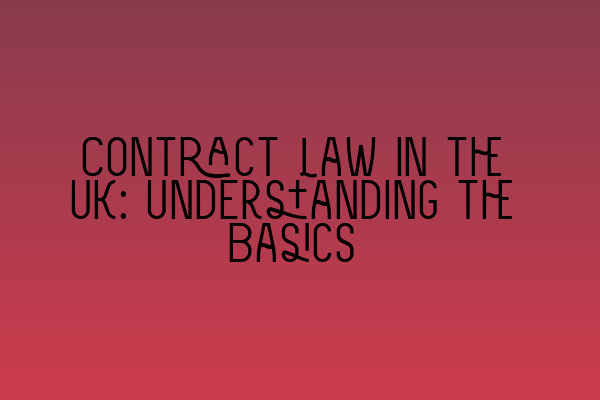Contract Law in the UK: Understanding the Basics
Contracts play a vital role in our daily lives, whether we realize it or not. From buying a cup of coffee to entering into major business deals, contract law governs the agreements we make with others. Understanding the basics of contract law is essential for both individuals and businesses to protect their rights and obligations. In this article, we will explore the key concepts of contract law in the UK, providing you with a solid foundation of knowledge.
What is a Contract?
At its core, a contract is a legally binding agreement between two or more parties. It outlines the rights and responsibilities of each party involved and provides a framework for how the agreed terms will be fulfilled. Contracts can be verbal or written, but it is always wise to have written contracts in place to avoid any misunderstandings or disputes.
When creating a contract, there are a few essential elements that must be present:
- Offer: An offer is made by one party to another, indicating their willingness to enter into an agreement.
- Acceptance: The other party must accept the offer, demonstrating their agreement to the proposed terms.
- Consideration: Consideration refers to the exchange of something of value between the parties involved, such as money, goods, or services.
- Intention to create legal relations: Both parties must intend for the contract to be legally binding.
- Capacity: Each party must be of legal age and have the mental capacity to enter into a contract.
Without these essential elements, a contract may not be legally enforceable.
Types of Contracts
Contracts can take various forms and serve different purposes. Some common contract types include:
- Written Contracts: These contracts are documented in writing and signed by all parties involved. They provide a clear record of the agreed-upon terms and conditions.
- Verbal Contracts: Verbal contracts are oral agreements without a written record. While they can be legally binding, they can be challenging to prove in court if a dispute arises.
- Implied Contracts: Implied contracts are formed based on the actions and behavior of the parties involved, rather than explicit written or verbal agreements.
- Unilateral Contracts: In a unilateral contract, one party makes a promise in exchange for a specific action from the other party. The contract is formed once the action is completed.
- Bilateral Contracts: Bilateral contracts involve mutual promises between both parties. Each party commits to fulfilling their obligations outlined in the contract.
Understanding the different types of contracts can help you navigate various situations and ensure that your legal rights are protected.
Terms of a Contract
The terms of a contract refer to the specific details and obligations agreed upon by the parties involved. These terms generally include:
- Price: The monetary value or consideration exchanged in the contract.
- Timeframe: The agreed-upon dates or deadlines for fulfilling the contractual obligations.
- Performance: The specific actions or deliverables expected from each party.
- Warranties and Disclaimers: Any guarantees or assurances provided by one party to the other regarding the quality or performance of goods or services.
- Confidentiality: Applicable when sensitive information needs to be protected from disclosure.
- Termination: The conditions under which either party can end the contract.
It is crucial to clearly outline and understand the terms of a contract to avoid any potential disputes or misunderstandings in the future.
Breach of Contract
When one party fails to fulfill their obligations under a contract, it is considered a breach of contract. Breach of contract can occur in several ways:
- Non-performance: When one party fails to deliver the agreed-upon goods or services.
- Delay in performance: When one party does not meet the specified deadlines or timeframes.
- Inferior performance: When the delivered goods or services do not meet the quality or standards agreed upon.
If a breach of contract occurs, the non-breaching party may be entitled to various remedies, such as seeking damages or specific performance to enforce the contract.
Seek Legal Advice
While this article provides a general understanding of contract law basics in the UK, navigating the intricacies of specific contracts can be complex. It is always advisable to seek professional legal advice for your specific situation. At SQE Contract Law, our team of experienced solicitors is well-versed in contract law and can provide expert guidance tailored to your needs.
If you would like to further enhance your knowledge of Contract Law or prepare for your upcoming SQE exams, we recommend checking out these related articles:
SQE 1 Practice Exam Questions
SQE 1 Practice Mocks FLK1 FLK2
SQE 2 Preparation Courses
SQE 1 Preparation Courses
SRA SQE Exam Dates
At SQE Contract Law, we are committed to helping you succeed in your legal education and career.
